Falls are the most frequently reported adverse event in nursing homes. Astonishingly, between half and three-quarters of nursing home residents fall each year, and many of these falls result in serious injuries. PA nursing home lawyers help residents and their families seek compensation when a preventable fall results in serious injury.
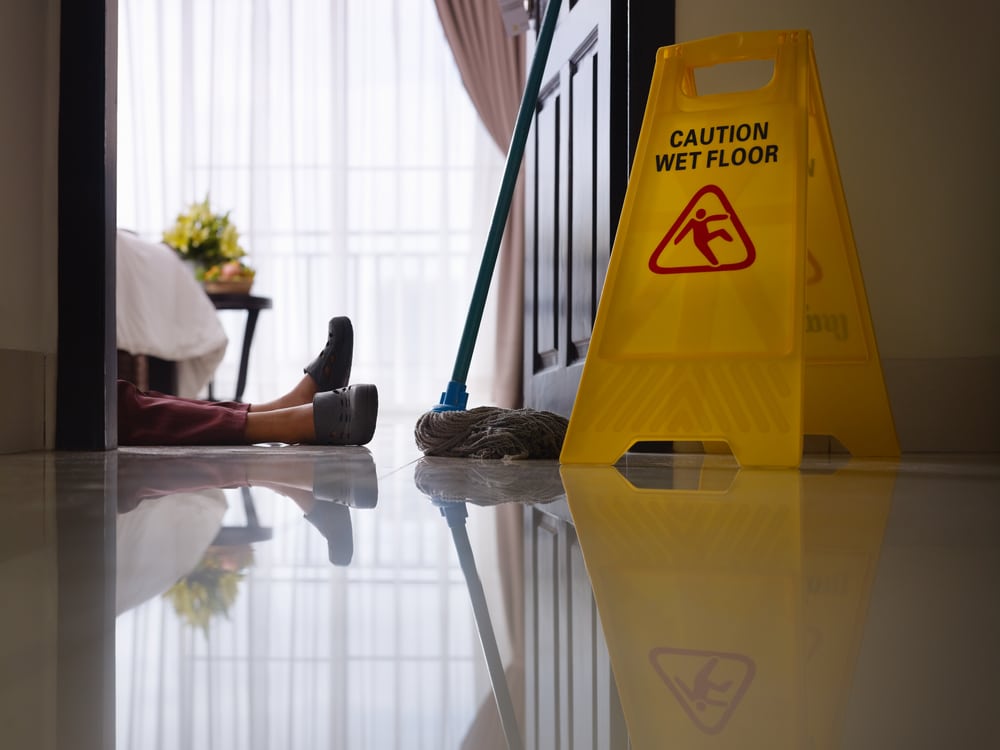 Nursing Home Liability for Falls
Nursing Home Liability for FallsIn long-term care facilities, a fall is defined as failure to maintain an appropriate lying, sitting, or standing position, resulting in an individual’s abrupt, undesired relocation to a lower level. It is even considered a fall if a resident loses their balance and would have fallen if another person had not intervened.
A nursing home is potentially liable when a resident falls and sustains a serious injury. The nursing home may be liable for the fall if they acted in a manner that caused a fall, or if they failed to take the appropriate actions to prevent the fall.
42 U.S. Code § 1395i–3 outlines the minimum standards for safety and quality care that skilled nursing facilities and nursing homes must follow. This law requires that nursing homes provide care in a way that maintains or enhances the resident’s quality of life and accommodates their needs. By following these regulations, nursing homes can prevent fall injuries. Nursing homes that fail to adhere to these standards leave residents at risk for serious, preventable fall injuries.
The nursing home industry is one of the most regulated industries in the United States. Therefore, it’s important to contact a nursing home abuse lawyer Philadelphia PA relies on for their in-depth knowledge of both personal injury law and the nursing home industry. The PA nursing home lawyers at the Wieand Law Firm have in-depth knowledge of both state and federal nursing home regulations and can apply this knowledge to benefit our clients in fighting back against nursing home neglect.
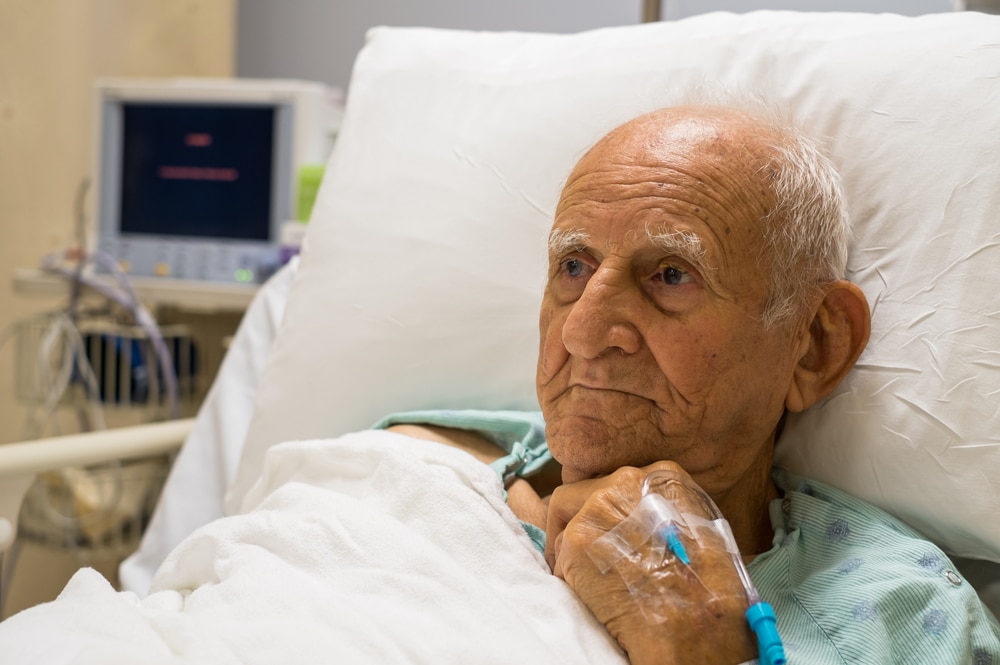 Federal Regulations for Fall Prevention
Federal Regulations for Fall PreventionThe regulations outline steps that nursing homes must take to prevent falls. According to §483.25(d1)-(d(2), nursing homes must maintain an environment free from hazards and also provide each resident with adequate supervision and assistance devices to prevent accidents. An accident is an unexpected or unintentional incident, such as a fall, that may result in harm or injury to the resident.
Avoidable falls happen when the nursing home fails to:
When a nursing home fails to take the required steps to prevent a fall, consider contacting PA nursing home lawyers at the Wieand Law Firm to discuss filing a nursing home negligence case. Nursing homes that neglect to take the necessary steps to prevent a fall must be held liable so that they make systemic changes to ensure these preventable injuries do not reoccur.
Nursing homes are required by both federal laws to complete a fall risk assessment for every resident. A comprehensive fall risk assessment is probably the most important component to a nursing home’s fall reduction and prevention program. The purpose of fall-risk assessment is to evaluate a patient’s risk for falling to correct problems and ultimately prevent falls from occurring.
Fall risk assessment should be completed upon a resident’s admission to a nursing home, upon transfer to a new unit, when the level of care changes and after a fall. Several well-known fall risk assessment tools used by nursing homes are the Hendrich II Fall Risk Model, the Morse Fall Scale, and St. Thomas’ Risk Assessment Tool in Falling Elderly Inpatients.
After a fall risk assessment is completed, nursing homes should implement an action plan and patient-specific fall prevention strategies. This may include simple measures such as installing grab bars in bathrooms and handrails in the hallways make it easier for residents ambulate safely, adapting chairs to the individual residents’ seating needs, or ensuring that appropriate fitting footwear is worn by residents. Other residents may be care planned to have fall protection mats and hip pads to help prevent a fracture if a fall occurs.
Long-term care facilities need to educate their staff about fall risk factors and prevention strategies. Medical staff should closely monitor and assess a patient’s prescribed medications for its potential risks and benefits. Residents who do not suffer from cognitive impairment should be taught strategies to avoid hazardous situations that put the resident at risk for falling. In addition, exercise programs can improve balance strength and the ability to ambulate.
Residents who are identified as being at risk for falls should receive necessary assistance from nursing home staff to prevent falls and reduce their risk of injury. For many nursing home negligence cases, the liability falls in not what the nursing home did, but what it failed to do.
Most nursing homes take a “one-size-fits-all” approach to falls management, routinely implementing the same interventions for all residents without personalization. This is both inappropriate and ineffective. This lack of individualization of fall interventions is frequently due to understaffing and lack of training. Failure to personalize and implement fall interventions based on the residents’ needs may cause an avoidable fall with serious injury.
Consult the graphic for examples of fall prevention interventions.
Facilities that fail to act to prevent falls put their residents at risk of serious injury. Contact a nursing home abuse lawyer Philadelphia PA counts on when you believe that a care facility failed to prevent a fall and your loved one suffered a serious injury as a result.
Ensuring a safe, hazard-free environment is paramount to resident safety. However, approximately one quarter (25%) of nursing home falls are the result of environmental hazards at the facility. Common hazards include:
Facilities that fail to take steps to eliminate environmental hazards may be liable for a resident’s serious fall injury. Contact a nursing home abuse lawyer Philadelphia PA trusts to find out if you may be eligible to file a nursing home negligence case for your loved one’s fall injury.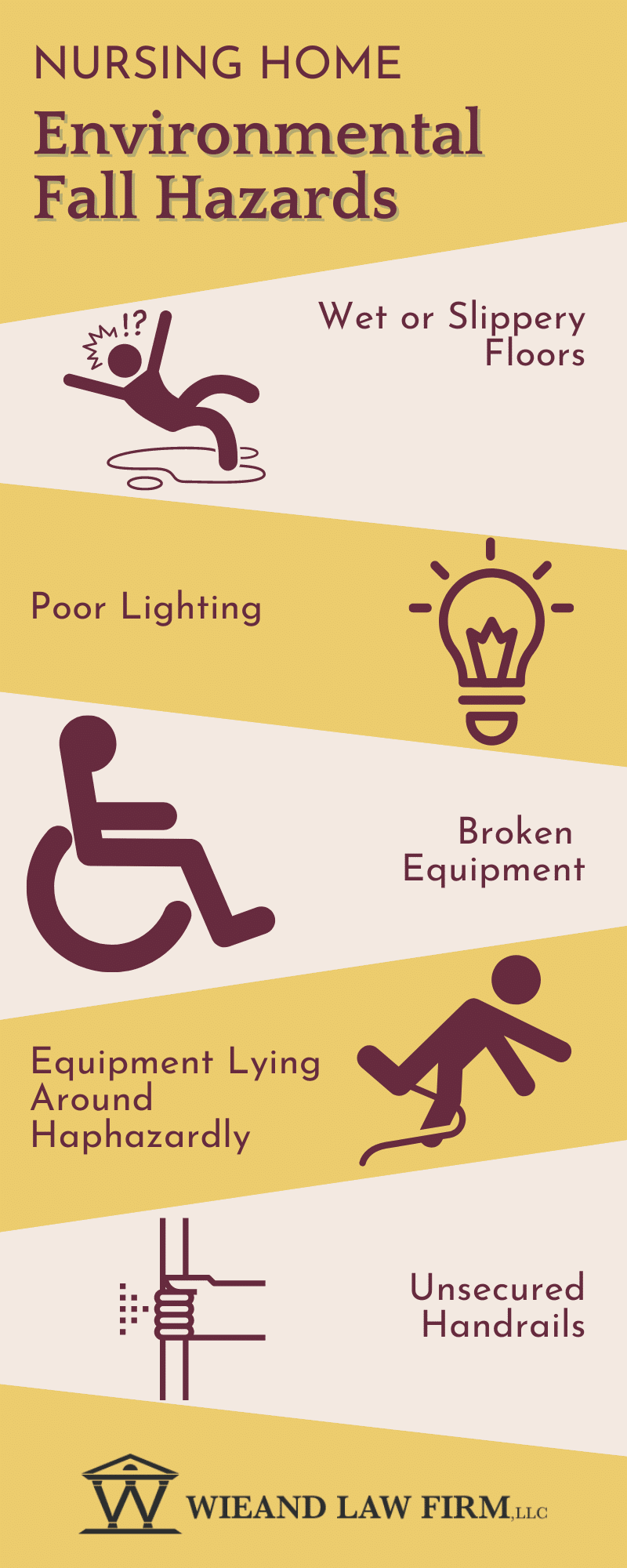
Falls and fall-related injuries often result in sudden and catastrophic injury. Falls result in:
After a fall, the resident may develop a fear of falling that leads to progressive mobility decline, even in the absence of a fall-related injury. The loss of mobility has serious social, psychological, and physical consequences.
If your loved one suffered one of these fall injuries, contact PA nursing home lawyers for a personal case review and evaluation. Our firm helps injured victims by filing a nursing home negligence case to seek just compensation for their injuries.
Legal Action for Falls Causing Fractures or Serious Injuries
Sometimes falls are unavoidable; however, in instances in which the nursing home staff was negligent, you can file a nursing home negligence case to hold the facility legally responsible for the damages caused to the resident. The facility may be responsible for monetary damages, including medical bills, pain and suffering, and loss of life’s pleasures. It is important to retain a nursing home abuse lawyer Philadelphia PA counts on to assist you in holding the facility and staff members accountable.
The Wieand Law Firm represent injured victims of nursing home negligence and their families. Our team on PA nursing home lawyers will conduct a thorough investigation. This may include hiring industry experts to review and provide testimony to your claim. Nursing home negligence cases require that the plaintiff proves that they sustained financial, physical, and emotional damages as the result of their loved one’s injuries.
To file a nursing home negligence case, you must be able to show that your claims are actionable based on certain legal criteria. Nursing home negligence cases fall under the umbrella of personal injury law. Therefore, to file a lawsuit, you will need to be able to demonstrate that:
Common types of evidence that our attorneys will gather in a nursing home negligence case include:
The type of evidence needed will vary based on the relevant facts of your specific claim. Proving these cases is complex, so consider hiring a nursing home abuse lawyer Philadelphia PA counts on to represent your interests.
Falls are alarmingly common in nursing home residents. This is particularly disturbing because the risk serious injuries from fall is greater in elderly nursing home patients than in younger, healthier individuals. Nursing home residents often have co-morbidities, such as osteoporosis, that can make them more prone to serious injuries.
Because of their frailty, serious fall injuries can lead to death for nursing home residents. Each year, it’s estimated that 1,800 elderly nursing home patients die from fall-related injuries.
Yes. Nursing homes have a duty of care to prevent fall injuries. When facilities breach this duty, it’s time to contact nursing home negligence lawyers Philadelphia PA trusts at the Wieand Law Firm. Our lawyers can discuss your legal option to file a wrongful death claim.
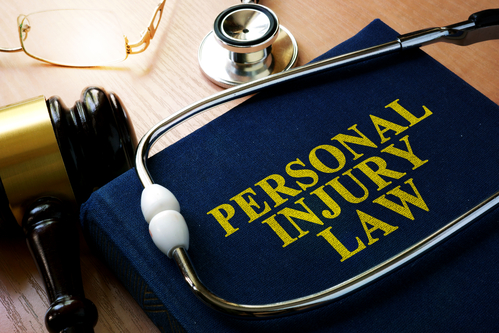 What is the Average Settlement Amount for a Nursing Home Negligence Case?
What is the Average Settlement Amount for a Nursing Home Negligence Case?The PA nursing home lawyers at the Wieand Law Firm are frequently asked about the average settlement amounts for a nursing home negligence case. Before understanding settlement values, its important to understand what a nursing home lawsuit settlement is and what factors influence settlement values.
A settlement occurs when the nursing home agrees to provide financial compensation to the victim of nursing home neglect or their family. In this situation, the plaintiffs agree not to proceed with bringing the case to court. Families often receive the compensation faster with a settlement than they would by bringing a nursing home lawsuit to court.
Nursing home settlements provide compensation for the damages the victim sustained due to the defendant’s negligence. These damages may include compensation for the victim’s medical expenses, pain and suffering, and other expenses.
Reaching a settlement may be preferrable in many situations than going to trial. First, settlement agreements are typically reached faster than proceeding to a jury trial. Also, agreeing on a settlement value allows the plaintiff to receive a guaranteed amount of compensation, whereas the jury trial may result in a verdict for either the plaintiff or the defendant. Talk with a nursing home abuse lawyer Philadelphia PA relies on to discuss whether a settlement is the best option for your case.
Several factors can affect the value of your nursing home settlement. These factors include:
The nature of your injuries and the facts of the case can influence your settlement amount. For example, a wrongful death case may be worth more than a case involving an infection that eventually resolved. Cases that involved broken bones or brain bleeds due to an avoidable fall may be considered stronger cases and earn higher settlement values.
The location of the nursing home where the negligence occurred determines which court has jurisdiction in the case. Local laws, such as penalty caps, may influence settlement amounts. Speak to one of the attorneys at our firm for a better understanding how jurisdiction could impact your claim.
PA nursing home lawyers may review previous nursing settlement amounts from cases similar to yours. Past case values may help your attorney seek a just settlement for your nursing home negligence case. Our legal support team performs research to understand the precedence that may influence your case value.
Your chance at winning at trial will influence whether the defendant offers a just settlement amount. Working with a nursing home abuse lawyer Philadelphia PA trusts can give you confidence that your interests will be represented and that you will receive the maximum compensation for your case.
Since all these factors influence the amount of your case, it’s impossible to make a blanket statement regarding case value of an individual nursing home negligence case. However, many nursing home lawsuit settlements achieve amounts of $400,000 or more, with some cases reaching settlement values in the millions.
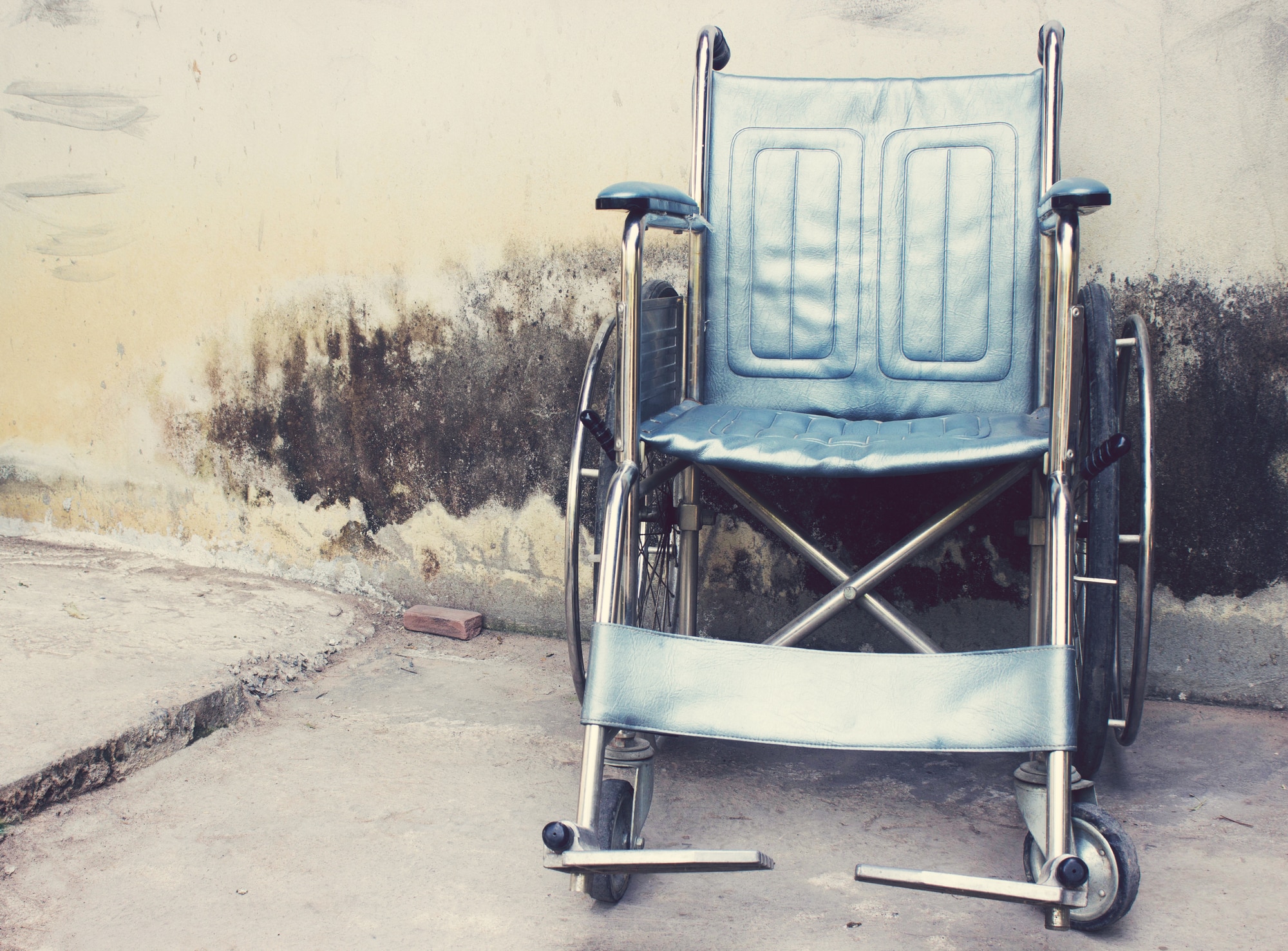 Will My Nursing Home Negligence Case Go to Trial?
Will My Nursing Home Negligence Case Go to Trial?Most nursing home neglect claims settle out of court. But when an agreeable settlement cannot be reached, the plaintiff is entitled to bring the nursing home neglect lawsuit to court. Our trial lawyers take the approach to prepare each case as if it will eventually end up at trial. Our lawyers are prepared to present your case before a jury if we can’t reach a just settlement outside of court.
Once a case goes to trial, our layers will present it before a jury. At the conclusion the trial, the jury will issue a verdict. If the jury finds on the side of the plaintiff, they will issue an award, which is a sum of money issued to the injured victim.
The PA nursing home lawyers at the Wieand Law Firm are trial lawyers. This means that our lawyers have years of experience in taking personal injury cases to court and winning cases for our clients in jury trials. Our legal team is adept at arguing motions, taking depositions, and addressing issues with judges and opposing counsel, and presenting your case strategically. We understand the nuances of courtroom and how to prepare our client’s case to provide the best possible outcome.
When your loved one has been injured by a care facility’s negligence, contact the nursing home abuse lawyer Philadelphia PA trusts at the Wieand Law Firm. Take advantage of a free consultation with our qualified and professional PA nursing home lawyers to discuss your potential claim and learn about your legal rights. Call 215-666-7777 or send us a message via the online form to start a conversation with an attorney.
The lawyers at the Wieand Law Firm offer a contingency fee agreement to our nursing home negligence clients. Clients pay no upfront fees, monthly fees, or retainers. Instead, our lawyers work on your behalf and only earn a fee if we win money for your case. The lawyer fees are ultimately paid out of the percentage of the settlement or award that the client receives.
The contingency fee arrangement’s main benefit is that it allows clients to access the qualified professional legal services of Wieand Law without worrying about spending money out of their pocket. We believe every individual deserves access to legal counsel for personal injuries. Our firm is committed to representing injured victims, not insurance companies. Speak with one of the attorneys at our firm for more details about our contingency fee agreement.
Individuals who are considering legal counsel for a personal injury claim will have many questions. The Wieand Law Firm offers a free case review and evaluation for potential clients. This case review helps us to learn more about the unique circumstances surrounding your case. We can discuss your legal options and help you understand the benefits of hiring a personal injury attorney. If we aren’t the best fit for your claim, we can even help refer you to a firm that can help.
Call today to speak directly with an attorney about your potential case. We are here to help you navigate the legal process and to provide the representation you need to get the maximum compensation for your injuries. Nursing home negligence can’t be tolerated, and our lawyers are prepared to fight vigorously for your rights. Call 215-666-7777 or send us a message to schedule your free case evaluation.
– Results may vary depending on your particular facts and legal circumstances
Review: 5/5
★ ★ ★ ★ ★
“I highly recommend the Wieand Law Firm. Brent’s team of professionals are diligent, responsive, and always had my interests at heart.”
-William Cunningham
